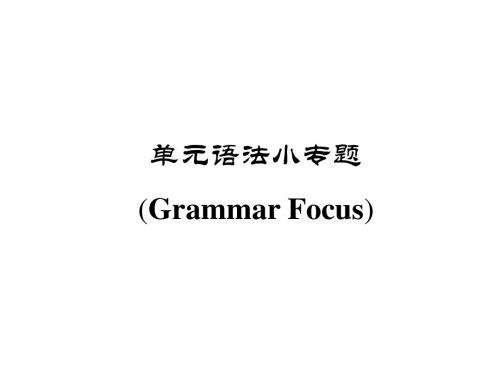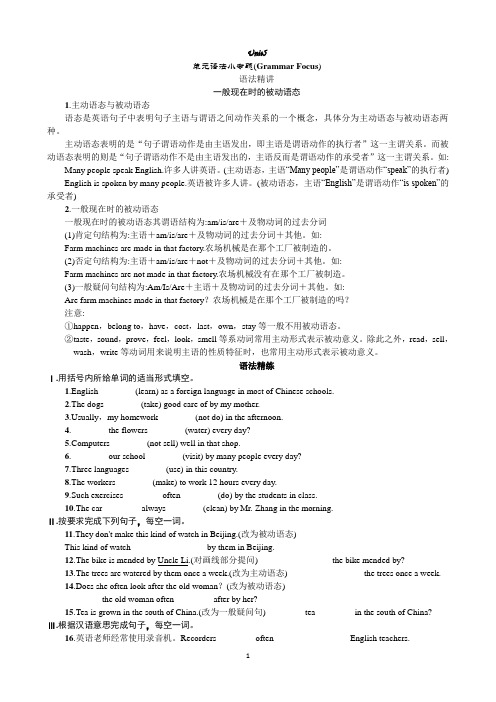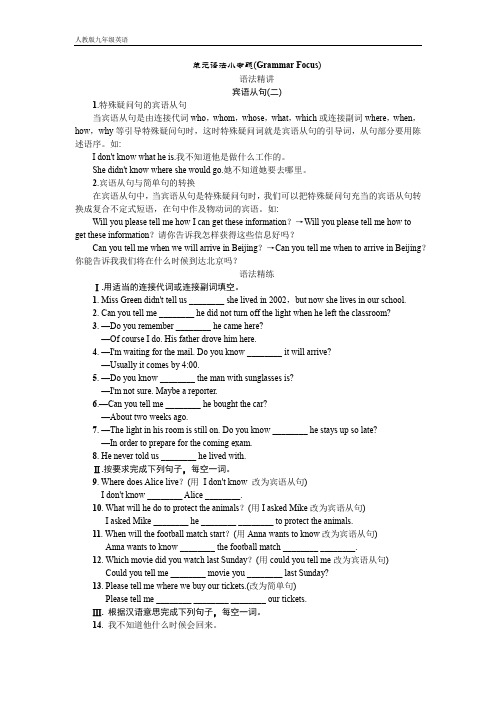单元语法小专题.doc
- 格式:doc
- 大小:82.50 KB
- 文档页数:2




单元语法小专题(Grammar Focus~3c),01语法精讲一、方位介词的用法英语中,当要表示某人或某物在某地时,通常要借助于方位介词。
方位介词不能单独充当句子成分,必须与其他词或短语构成介词短语放在be动词或其他动词后面作表语或状语等,也可放在名词后作定语。
下面我们来看一下本单元学到的三个方位介词。
1.on意为“在……上”,表示一个物体在另一个物体的表面上。
例如:The book is on the desk.那本书在书桌上。
2.in意为“在……里”,表示一个物体在另一个物体的内部。
例如:The dictionary is in the schoolbag.字典在书包里。
3.under意为“在……下”,表示一个物体在另一个物体的正下方,但两个物体并不接触。
例如:Is the baseball under the chair?棒球在椅子下面吗?二、where引导的特殊疑问句1.用法where是疑问副词,意为“在哪里;到哪里”,用来引导特殊疑问句。
常用句型“Where is+单数名词/代词?”或“Where are+复数名词/代词?”询问人或物所在的位置。
例如:Where is my eraser?我的橡皮在哪里?Where is she?她在哪儿?Where are the keys?钥匙在哪里?Where are they?他们在哪儿?2.答语(1)用It's…(对应Where is…?)或They're…(对应Where are…?)作答。
例如:—Where is my eraser?我的橡皮在哪里?—It's in your pencil box.它在你的铅笔盒里。
—Where are the keys?钥匙在哪里?—They're under the bed.它们在床下面。
(2)直接说出物品所在地点,省略it's或they're。
例如:—Where's the clock?时钟在哪里?—On the wall.在墙上。

Unit5单元语法小专题(Grammar Focus)语法精讲一般现在时的被动语态1.主动语态与被动语态语态是英语句子中表明句子主语与谓语之间动作关系的一个概念,具体分为主动语态与被动语态两种。
主动语态表明的是“句子谓语动作是由主语发出,即主语是谓语动作的执行者”这一主谓关系。
而被动语态表明的则是“句子谓语动作不是由主语发出的,主语反而是谓语动作的承受者”这一主谓关系。
如: Many people speak English.许多人讲英语。
(主动语态,主语“Many people”是谓语动作“speak”的执行者) English is spoken by many people.英语被许多人讲。
(被动语态,主语“English”是谓语动作“is spoken”的承受者)2.一般现在时的被动语态一般现在时的被动语态其谓语结构为:am/is/are+及物动词的过去分词(1)肯定句结构为:主语+am/is/are+及物动词的过去分词+其他。
如:Farm machines are made in that factory.农场机械是在那个工厂被制造的。
(2)否定句结构为:主语+am/is/are+not+及物动词的过去分词+其他。
如:Farm machines are not made in that factory.农场机械没有在那个工厂被制造。
(3)一般疑问句结构为:Am/Is/Are+主语+及物动词的过去分词+其他。
如:Are farm machines made in that factory?农场机械是在那个工厂被制造的吗?注意:①happen,belong to,have,cost,last,own,stay等一般不用被动语态。
②taste,sound,prove,feel,look,smell等系动词常用主动形式表示被动意义。
除此之外,read,sell,wash,write等动词用来说明主语的性质特征时,也常用主动形式表示被动意义。

单元语法小专题(Grammar Focus)语法精讲宾语从句(二)1.特殊疑问句的宾语从句当宾语从句是由连接代词who,whom,whose,what,which或连接副词where,when,how,why等引导特殊疑问句时,这时特殊疑问词就是宾语从句的引导词,从句部分要用陈述语序。
如:I don't know what he is.我不知道他是做什么工作的。
She didn't know where she would go.她不知道她要去哪里。
2.宾语从句与简单句的转换在宾语从句中,当宾语从句是特殊疑问句时,我们可以把特殊疑问句充当的宾语从句转换成复合不定式短语,在句中作及物动词的宾语。
如:Will you please tell me how I can get these information?→Will you please tell me how toget these information?请你告诉我怎样获得这些信息好吗?Can you tell me when we will arrive in Beijing?→Can you tell me when to arrive in Beijing?你能告诉我我们将在什么时候到达北京吗?语法精练Ⅰ.用适当的连接代词或连接副词填空。
1. Miss Green didn't tell us ________ she lived in 2002,but now she lives in our school.2. Can you tell me ________ he did not turn off the light when he left the classroom?3. —Do you remember ________ he came here?—Of course I do. His father drove him here.4. —I'm waiting for the mail. Do you know ________ it will arrive?—Usually it comes by 4:00.5. —Do you know ________ the man with sunglasses is?—I'm not sure. Maybe a reporter.6.—Can you tell me ________ he bought the car?—About two weeks ago.7. —The light in his room is still on. Do you know ________ he stays up so late?—In order to prepare for the coming exam.8. He never told us ________ he lived with.Ⅱ.按要求完成下列句子,每空一词。
单元语法小专题(Grammar Focus~3c),01语法精讲一、指示代词this,these,that和those在这四个指示代词中,this意为“这;这个”,these意为“这些”,指离说话人较近的人或物;that意为“那;那个”,those意为“那些”,指离说话人较远的人或物。
当this或that作主语时,be动词要用单数形式is,后面的名词也用单数形式;当these或those作主语时,be动词要用复数形式,后面的名词也用复数形式。
例如:This is my brother.这是我的哥哥。
That is a blue cup.那是一只蓝色的杯子。
These are her parents.这些是她的父母。
Those are his friends.那些是他的朋友。
【拓展】当回答含有this或that作主语的问句,且this或that指物时,应用it代替句中的this或that;当回答含有these或those作主语的问句时,应用they代替句中的these或those。
例如:—Is that your pen?那是你的钢笔吗?—Yes,it is.是的,它是。
—Are these his grandparents?这些是他的(外)祖父母吗?—No,they aren't.不,他们不是。
【注意】1.介绍某人时,用this或that,而不用he或she。
2.打电话时,介绍自己时用“This is…”,问别人是谁用“Who's that?”。
例如:Hello!This is Mary.Who's that?喂!我是玛丽。
您是哪位?二、单数句与复数句的转换单数句改为复数句是句型转换中的一个重要题型。
将单数句改为复数句常遵循如下规则:1.将单数句中的指示代词、人称代词、名词及be动词等变为对应的复数形式,如this→ these,that→ those,he/she/it→ they等。
单元语法小专题(Grammar Focus)语法精讲一、介词by的用法1.by表示方式、方法或手段,后接名词或动名词,意为“使用某物;靠;乘(车、船)等”。
如:Do you learn English by reading aloud?你通过大声朗读来学习英语吗?I often go to school by bike.我经常骑自行车去上学。
2.by表示时间,意为“到……时(为止);在……以前;不迟于”。
如:I have to go to bed by ten o'clock.我必须10点前睡觉。
3.by表示地点、位置,意为“靠近;在……旁边”。
如:The boy often reads books by the river.这个男孩经常在河边读书。
4.by表示移动的方向,意为“从……旁边经过”。
如:He walked by me without saying anything.他从我旁边经过,什么也没有说。
5.by表示根据,意为“按照”。
如:What time is it by your watch?你的手表几点了?6.by表示被接触身体的某一部分。
如:She took me by the hand.她拉着我的手。
二、动名词用法小结1.动名词在句中作主语动名词作主语时,谓语动词用第三人称单数形式。
此时也可以用it作形式主语,而把真正的主语后置。
如:Getting up early is good for your health.→It's good for your health to get up early.早起对你的健康有益。
2.动名词在句中作宾语动名词在句中作宾语时,一般放在某一及物动词或介词之后充当这一动词或介词的宾语。
(1)后接动名词作宾语的及物动词有:finish,enjoy,keep,stand(忍受),suggest,advise,practice,mind,imagine 等。
单元语法小专题(Grammar Focus)语法精讲形容词、副词的比较级1.概念:英语中大多数形容词、副词有三个等级:原级、比较级和最高级。
两者比较用比较级;三者或三者以上相比用最高级。
比较的对象必须是属于同一性质或范畴的人或物。
【注意】比较的对象必须一致;比较的双方必须在同一范围内。
表示两者在某一方面相同时,用“as+形容词或副词原级+as”的句型。
如:I think science is as important as math.我认为科学和数学一样重要。
表示一方在某一方面不及另一方时,用“not as/so+形容词或副词原级+as”的句型。
如:It is not as/so warm today as yesterday.今天不如昨天暖和。
语法精练Ⅰ.用括号内所给单词的适当形式填空。
1.I think Sally did as ________(better) as Lucy in the math competition.2.Linda is much ________ (hard-working) than Anna.3.Who has ________ (many) books,Zhang Li or Li Ying?4.Do you think you are ________ (outgoing) than your father?5.It was cold yesterday,but it is much ________ (cold) today.6.This box is much ________(heavy),isn't it?7.Who is ________ (funny) than you in your class?8.I work ________(hard) this term,but David works even ________(hard).9.Which day was ________(hot),today or yesterday?10.This story is very ________(interesting),but that story is ________(interesting) than this one.Ⅱ.按要求完成下列句子,每空一词。
单元语法小专题(Grammar Focus)语法精讲一、序数词序数词用来表示事物的顺序,其前常加定冠词the。
1.序数词的构成:(1)英语中1~19的序数词,除了first,second,third 外,其余均由基数词加-th构成,但要注意fifth,eighth,ninth,twelfth的拼写形式。
(2)以-ty结尾的基数词,变为序数词时,将y变为i,再加-eth。
如:twenty→twentieth 第二十(3)“几十几”以上的基数词,变为序数词时,只把个位数变为序数词。
如:thirty-five→thirty-fifth第三十五(4)序数词的缩写形式是由阿拉伯数字后面加上序数词的最后两个字母构成。
如:23rd→twenty-third第二十三【记忆口诀】基变序有规律:结尾字母是th;一二三特殊记,结尾字母tdd;八去t九去e,f要把ve替;ty将y变成i,th前面还有一个e;几十几也好记,只变个位就可以。
2.序数词的用法:(1)序数词可以用来表示顺序、编号等,但要放在名词前面。
如:the second picture 第二幅图。
(2)序数词可以表示“几月几日”中的“几日”。
如:February 11th 2月11日August 3rd 8月3日(3)序数词前面通常要使用定冠词the,但当序数词前面有形容词性物主代词或名词所有格修饰时,不能用the。
如:That is the fourth book.那是第四本书。
This is Mike's twelfth birthday.这是迈克的第十二个生日。
二、名词所有格英语中名词后加上-'s便构成所有格,表明一种所有关系,这种所有格形式叫“-'s所有格”。
-'s所有格的构成如下:语法精练Ⅰ.用括号内所给单词的适当形式填空。
1.Mary is happy,because it's her ________(nine) birthday today.2.He is always the ________(one) one to come,but the last one to go.3.Today is ________(Bob) birthday.Let's have a party for him.4.Mike and Tom are ________(thirteenth) years old this year.5.The ________(twelve) month of the year is December.Ⅱ.单项选择。
单元语法刀、专题(Grammar Focus)
语法精讲
复合不定代词
不指明代替任何特定名词或形容词的代词叫做不定代词,如:some, any, much, many, both, few等。
本单元主要学习some, any, every, no加上thing或one构成的复合不定代词的含义及其用法。
复合不
定代词
含义用法例句
thing something 某事;某物肯定句I'd like something to eat. anything
某事;某物否定句及疑问句
Did you buy anything in the
store?
任何东西 (事物)
肯定句
You can take anything you
like—
everything 一切
肯定句、疑问句及
否定句
Don't worry.Evcrything
isOK—
nothing
没有
什么
用于否定句中,相
当于not anything
Mr.Smith sai —d nothing
then.
one
复合不
定代词
含义用法例句someone 某人肯定句Listen! Someone is singing.
anyone
某人
否定句和疑
问句Tom doesn't want to help anyone.
任何人
肯定句Anyone can do that.
everyone
人人;
大家
肯定句、否定
句及疑问句
Everyone doesn't like this movie.
no one
没有
人
否定句No one went to the mountains yesterday. 【温馨提示】
(1)复合不定代词作主语时,谓语动词常用单数形式。
如:
Everyone in the village is friendly.这个村子里的每个人都是友好的。
(2)复合不定代词若有定语(形容词或动词不定式)修饰时,定语要放在其后。
如:
Let's do something interesting.让我们做一些有趣的事。
I'd like something to drink.我想要一些喝的东西。
(3)在表示请求、建议等的疑问句中,问话者希望得到肯定答复时,常用含有some的不
定代词。
如:
Would you like something to eat?你想要一些吃的东西吗?
语法精练
1.用方框中所给的单词填空。
everyone, anything, nothing, something, anyone, everything
1.The ---- re isn't new in the whi — te box.
2.Tina is doing well in the ne ---- w school.There's to ― worry about.
3.Did you go to the farm with?
4.一._ in the room looks very tidy and clean.
e here! I have important to tell you.
6.一an you cook eggs with tomatoes?
—Yes, sure.can do it, because it is easy, I think ---------------------
II .从括号内选择正确的单词完成句子。
7.There(isn't/aren't) anything interesting in the book.
8.No one(were/was ----------------- ) in front of the house.
9.一Did your cousin buy(nothing/anything) in the supermarket?
10.Mar 一y didn't go to the post office with (anyone/someone) last Sunday morning. 11- The singer is ver一y great.Everyone here(know/knows) her.
in.按要求完成下列句子,每空一词。
12.There is something interesting in the story.(改为否定句)
There interesting in the story.
There interesting in the story.
13.Someone is reading in the classroom.(改为一般疑问旬)
reading in the classroom?
14.我妈妈不知道关于这件事的任何情况,因为没有人告诉她。
(汉译英)
My mother knows about it because told her.
单元语法小专题(Grammar Focus)
I. 1 .anything 2 ------ nothing 3.anyone 4.Evcrything 5-something
6. Everyone
II・7・isn't 8.was 9.anything 10.anyone 11 .knows
III. 12.isn't anything; is nothing 13.Is anyone 14.nothing; no one。